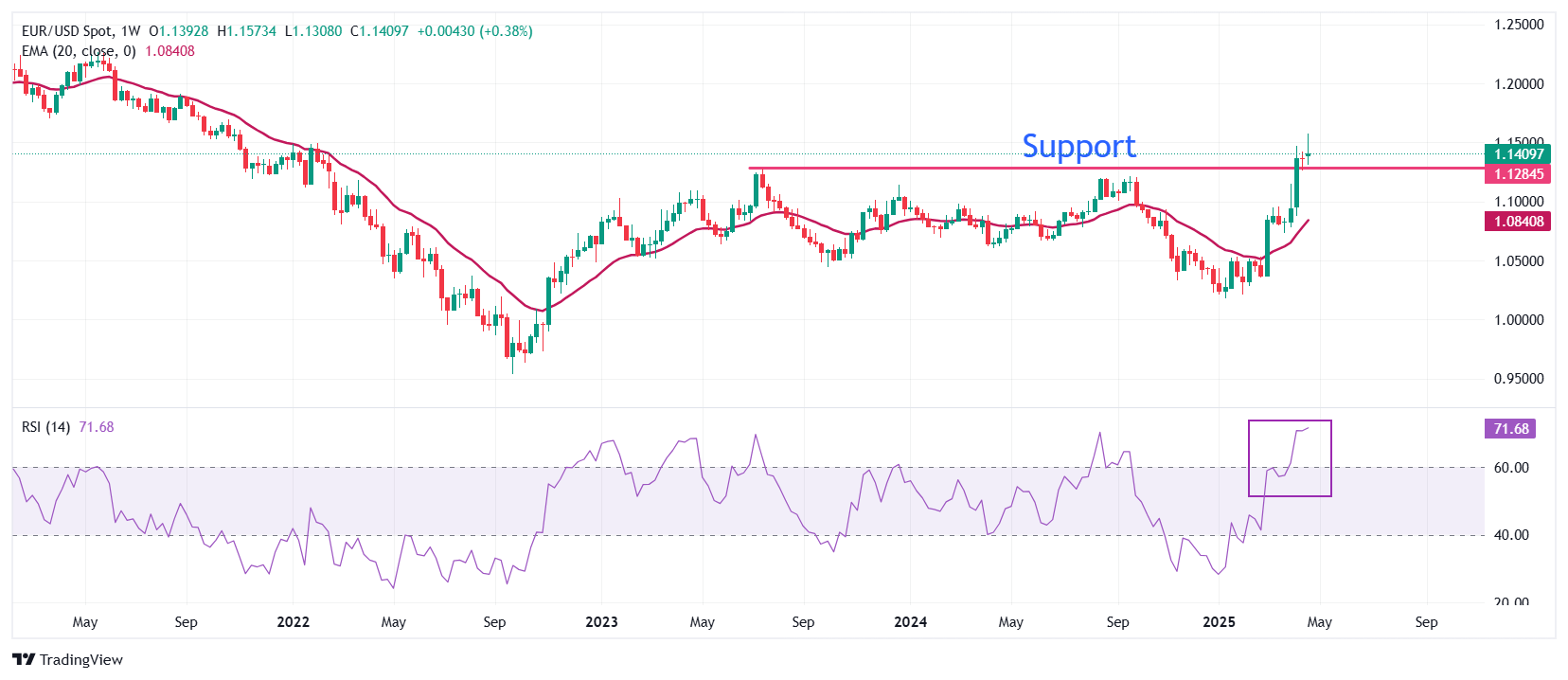Created
: 2025.04.23














![]() 2025.04.23 18:39
2025.04.23 18:39
EUR/USD trades broadly stable on Wednesday after dipping well below 1.1400 earlier in the European trading hours. The major currency pair is off from its over three-year high of 1.1575 as the US Dollar (USD) bounces back. The US Dollar Index (DXY), which tracks the Greenback's value against six major currencies, has rebounded to near 99.30 from its three-year low of 98.00.
The USD attracts bids after United States (US) President Donald Trump expressed confidence in closing a trade deal with China and backed away fears of sacking Federal Reserve (Fed) Chair Jerome Powell. Still, he said, he remained frustrated over the Fed's decision to keep interest rates on hold for an uncertain period of time.
Financial market participants are seeing this event as an attempt to regain the "safe-haven" status of the US Dollar. Investors had been doubting the credibility of the US Dollar and US assets due to back-and-forth announcements on tariff policies by Donald Trump and his attacks on the autonomous status of the Fed.
On Tuesday, US President Trump stated that discussions with China are going well, adding that he thinks they will reach a deal. Trump didn't provide clarity over how much he will reduce import duty on China, but clarified that the tariff on Beijing "would not be as high as 145%, but they wouldn't be zero".
President Trump pushed back against market expectations that he is aiming to remove Jerome Powell for not lowering interest rates. "The press runs away with things. No, I have no intention of firing him. I would like to see him be a little more active in terms of his idea to lower interest rates," Trump said.

EUR/USD briefly dipped below 1.1400 on Wednesday after facing selling pressure above 1.1500 on Tuesday and recovered afterwards. The major currency pair had shown a strong rally in the last few weeks after a breakout above the September 25 high of 1.1215. Advancing 20-week Exponential Moving Average (EMA) near 1.0840 suggests a strong upside trend.
The 14-week Relative Strength Index (RSI) climbs to overbought levels above 70.00, which indicates a strong bullish momentum but also signals increasing chances of a correction.
Looking up, the round-level figure of 1.1600 will be the major resistance for the pair. Conversely, the July 2023 high of 1.1276 will be a key support for the Euro bulls.
The Euro is the currency for the 19 European Union countries that belong to the Eurozone. It is the second most heavily traded currency in the world behind the US Dollar. In 2022, it accounted for 31% of all foreign exchange transactions, with an average daily turnover of over $2.2 trillion a day. EUR/USD is the most heavily traded currency pair in the world, accounting for an estimated 30% off all transactions, followed by EUR/JPY (4%), EUR/GBP (3%) and EUR/AUD (2%).
The European Central Bank (ECB) in Frankfurt, Germany, is the reserve bank for the Eurozone. The ECB sets interest rates and manages monetary policy. The ECB's primary mandate is to maintain price stability, which means either controlling inflation or stimulating growth. Its primary tool is the raising or lowering of interest rates. Relatively high interest rates - or the expectation of higher rates - will usually benefit the Euro and vice versa. The ECB Governing Council makes monetary policy decisions at meetings held eight times a year. Decisions are made by heads of the Eurozone national banks and six permanent members, including the President of the ECB, Christine Lagarde.
Eurozone inflation data, measured by the Harmonized Index of Consumer Prices (HICP), is an important econometric for the Euro. If inflation rises more than expected, especially if above the ECB's 2% target, it obliges the ECB to raise interest rates to bring it back under control. Relatively high interest rates compared to its counterparts will usually benefit the Euro, as it makes the region more attractive as a place for global investors to park their money.
Data releases gauge the health of the economy and can impact on the Euro. Indicators such as GDP, Manufacturing and Services PMIs, employment, and consumer sentiment surveys can all influence the direction of the single currency. A strong economy is good for the Euro. Not only does it attract more foreign investment but it may encourage the ECB to put up interest rates, which will directly strengthen the Euro. Otherwise, if economic data is weak, the Euro is likely to fall. Economic data for the four largest economies in the euro area (Germany, France, Italy and Spain) are especially significant, as they account for 75% of the Eurozone's economy.
Another significant data release for the Euro is the Trade Balance. This indicator measures the difference between what a country earns from its exports and what it spends on imports over a given period. If a country produces highly sought after exports then its currency will gain in value purely from the extra demand created from foreign buyers seeking to purchase these goods. Therefore, a positive net Trade Balance strengthens a currency and vice versa for a negative balance.
![]()
Created
: 2025.04.23
![]()
Last updated
: 2025.04.23

FXStreet is a forex information website, delivering market analysis and news articles 24/7.
It features a number of articles contributed by well-known analysts, in addition to the ones by its editorial team.
Founded in 2000 by Francesc Riverola, a Spanish economist, it has grown to become a world-renowned information website.
We hope you find this article useful. Any comments or suggestions will be greatly appreciated.
We are also looking for writers with extensive experience in forex and crypto to join us.
please contact us at [email protected].
Disclaimer:
All information and content provided on this website is provided for informational purposes only and is not intended to solicit any investment. Although all efforts are made in order to ensure that the information is correct, no guarantee is provided for the accuracy of any content on this website. Any decision made shall be the responsibility of the investor and Myforex does not take any responsibility whatsoever regarding the use of any information provided herein.
The content provided on this website belongs to Myforex and, where stated, the relevant licensors. All rights are reserved by Myforex and the relevant licensors, and no content of this website, whether in full or in part, shall be copied or displayed elsewhere without the explicit written permission of the relevant copyright holder. If you wish to use any part of the content provided on this website, please ensure that you contact Myforex.
Myforex uses cookies to improve the convenience and functionality of this website. This website may include cookies not only by us but also by third parties (advertisers, log analysts, etc.) for the purpose of tracking the activities of users. Cookie policy